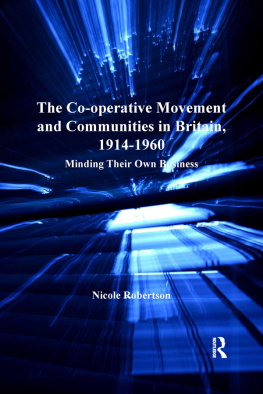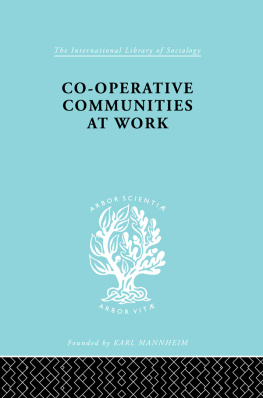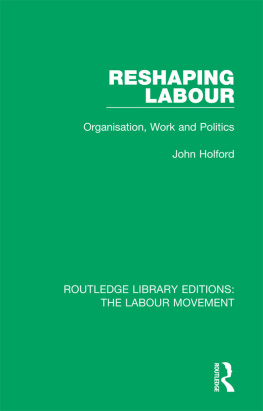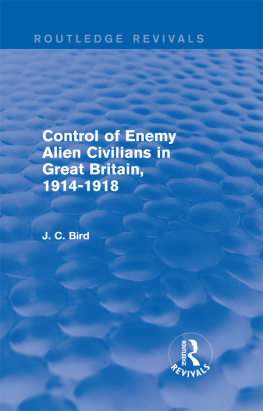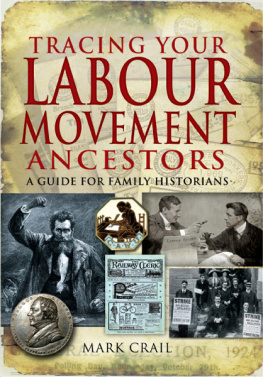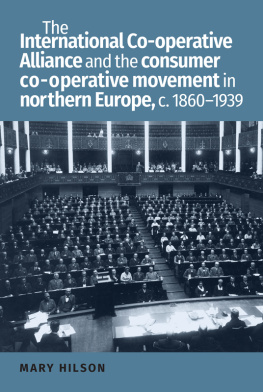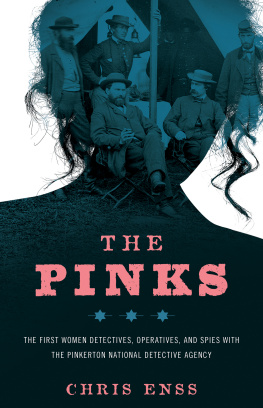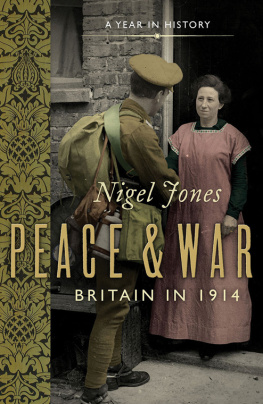THE CO-OPERATIVE MOVEMENT AND COMMUNITIES IN BRITAIN, 19141960 MINDING THEIR OWN BUSINESS
The co-operative movement has played a notable role in the retail, wholesale, productive, political, educational and cultural life of Britain. As a movement it has consciously represented consumer interests and has carried out work in the arena of consumer protection. However, its study has suffered relative neglect when compared to research into the Labour Party, trade unions and the wider politics of retail and consumption. This book reassesses the impact of the co-operative movement on various communities in Britain during the period 19141960, providing a comprehensive account of the grass roots influence of co-operatives during both war and peace.
This is a national study with a local dimension. It considers how national directives and perspectives were locally applied, if indeed they were applicable within the context of individual societies. Each chapter focuses on a different aspect of the co-operative movement by examining various societies in England, Scotland and Wales. Particular attention is paid to the midlands, due to the movements expansion here during the interwar period, with consideration also given to comparative developments in Europe. The author explores: the movements relationship with other labour organizations; its cultural and social aspects (including the role sport played in co-operative societies); the politicization of the movement and local response to the formation of the Co-operative Party; the education of co-operators; what co-operative membership entailed and how cooperative ideology was expressed; the economic impact membership could have on families (including the provision of financial assistance and credit); and the co-operative movements development alongside consumer activism.
The book is a major national study of the growth of Co-operation during this crucial period of British social, economic and consumer history. Given the few modern scholarly works on Co-operation, it is a timely and much needed reassessment.
Nicole Robertson is Lecturer in History at Northumbria University and previously held the R.H. Tawney Fellowship awarded by the Economic History Society/Institute of Historical Research. She was at the University of Nottingham during this Fellowship.
For my parents, Angela and Paul Robertson
The Co-operative Movement and Communities in Britain, 19141960
Minding Their Own Business
NICOLE ROBERTSON
Northumbria University, UK
First published by 2010 Ashgate Publishing
Published 2016 by Routledge
2 Park Square, Milton Park, Abingdon, Oxon OX14 4RN
711 Third Avenue, New York, NY 10017, USA
Routledge is an imprint of the Taylor & Francis Group, an informa business
Copyright Nicole Robertson 2010
Nicole Robertson has asserted her right under the copy, Designs and Patents Act, 1988, to be identified as the author of this work.
All rights reserved. No part of this publication may be reproduced, stored in a retrieval system or transmitted in any form or by any means, electronic, mechanical, photocopying, recording or otherwise without the prior permission of the publisher.
Notice:
Product or corporate names may be trademarks or registered trademarks, and are used only for identification and explanation without intent to infringe.
British Library Cataloguing in Publication Data
Robertson, Nicole.
The co-operative movement and communities in Britain, 19141960: Minding their own business. (Studies in labour history)
1. Consumer cooperativesGreat BritainHistory20th century. 2. Consumer cooperativesSocial aspectsGreat BritainHistory20th century. 3. Working classPolitical activityGreat BritainHistory20th century.
I. Title II. Series
334.509410904-dc22
Library of Congress Cataloging-in-Publication Data
Robertson, Nicole.
The co-operative movement and communities in Britain, 19141960: Minding their own business / Nicole Robertson.
p. cm. (Studies in labour history)
Includes bibliographical references and index.
ISBN 978-0-7546-6057-6 (hbk.: alk. paper) 1. Cooperative societiesGreat BritainHistory20th century. 2. ConsumersGreat BritainHistory20th century. 3. Community lifeGreat BritainHistory20th century. 4. Community developmentGreat BritainHistory20th century. I. Title.
HD3325.A4R63 2009
334.094109041dc22 |
2009047146 |
ISBN 9780754660576 (hbk)
Contents
List of Figures
List of Tables
Studies in Labour History General Editors Preface
This series of books provides reassessments of broad themes in labour history, along with more detailed studies arising from the latest research in the field. Most books are single-authored but there are also volumes of essays, centred on key themes and issues, usually emerging from major conferences organised by the British Society for the Study of Labour History. Every author approaches their task with the needs of both specialist and non-specialist readerships in mind, for labour history is a fertile area of historical scholarship, stimulating wide-ranging interest, debate and further research, within both social and political history and beyond.
When this series was first launched (with Chris Wrigley as its general editor) in 1998, labour history was emerging, reinvigorated, from a period of considerable introspection and external criticism. The assumptions and ideologies underpinning much labour history had been challenged by postmodernist, anti-Marxist and, especially, feminist thinking. There was also a strong feeling that often it had emphasised institutional histories of organised labour, at the expense of histories of work generally, and of workers social relations beyond their workplaces especially gender and wider familial relationships. The Society for the Study of Labour History was concerned to consolidate and build upon this process of review and renewal through the publication of more substantial works than its journal Labour History Review could accommodate, and also to emphasise that though it was a British body, its focus and remit extended to international, transnational and comparative perspectives.
Arguably, the extent to which labour history was narrowly institutionalised has been exaggerated. This series therefore includes studies of labour organisations, including international ones, where there is a need for modern reassessment. However, it is also its objective to maintain the breadth of labour historys gaze beyond conventionally organised workers, sometimes to workplace experiences in general, sometimes to industrial relations, and naturally to workers lives beyond the immediate realm of work.
Malcolm Chase
Society for the Study of Labour History
University of Leeds
Acknowledgements
Many people have supported me over the course of this project, including and especially Chris Wrigley. It was his teaching and enthusiasm during my undergraduate years that first sparked my interest in this area of history. His encouragement, guidance and advice over the subsequent years have made this book possible. I also owe a huge debt of thanks to Declan Dixon and Ann Hurford for all of their help and wordy knowledge. I wish to acknowledge the support of staff in the School of History at the University of Nottingham, and to thank Alun Burge, Dick Geary, Peter Scott, Maggie Walsh and John Walton who have provided guidance, comments and suggestions for the development of my research. I very much enjoyed interviewing Andrea Pettingale and Bob Quinney, and I wish to thank them for their time and the information they gave me. I have very fond memories of speaking with Dorothy and John Pheasant about their recollections of their local co-operative society, and our conversations are incorporated in this book. I am also grateful to: Robyn Austin for her assistance; Ruth Dixon for her continued help; Stephen Lee, Gail Paten and Louise Strong for putting me up during numerous research trips; and Martin Robertson for driving me to various archives.

